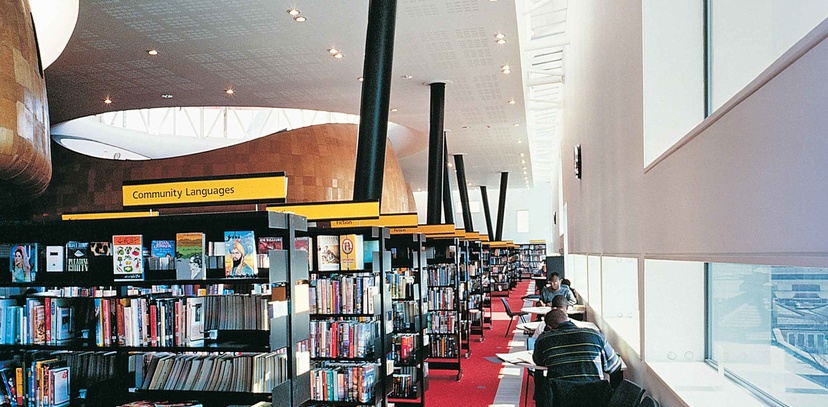
Researcher Mena Ali blogs about libraries, appreciating their core role in supporting us socially, economically and educationally.
In an era marked by budget cuts, public libraries have become a disposable resource - over 800 libraries in the UK closed in the past decade. This is equivalent to 20 percent of the total libraries in the UK. However, libraries play an essential role in local communities by providing access to resources, services, and information.
Unfortunately, the public dimension of libraries is often overlooked. As a space where connections are made, and communities thrive, libraries are vital pieces of social infrastructure.
In our Connective Social Infrastructure report for the Mayor of London, social infrastructure is described as “a range of services and facilities that meet local and strategic needs and contribute towards a good quality of life”. Physical and institutional spaces play a key role in the development of social connections, while informal social infrastructure networks facilitate new and existing relationships that make communities more connected and resilient. Libraries cannot solely be seen as buildings to house books, they are a hub for communities, they provide flexible spaces which can be used for many activities from speech therapy, to playgroups, chess clubs and yoga. They have a key role in responding to some of the most pressing challenges of urban life.
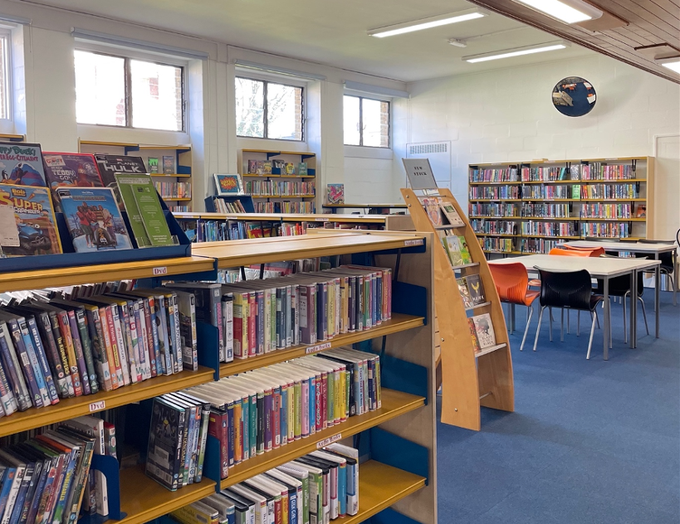
Homerton Library, Hackney
Libraries offer a full range of activities and programs that cater to diverse audiences. from access to digital services, book clubs, children’s programs and more. In our recent work in Hackney revealed that Homerton library was the most used council asset in King’s Park ward, half of local we surveyed had used the library in the past three months. Notably, access to books, quiet spaces, and digital services such as computers and internet were highly valued by users.
Libraries with dedicated study spaces offer vital spaces for those lacking ideal study environments at home, providing a space for focus. Anyone visiting libraries in May and June - when young people are taking GCSEs and A-levels - will see the importance of libraries in supporting education.
Libraries contribute significantly to improving literacy skills, research conducted by the Department for Digital, Culture, Media, and Sport has provided compelling evidence for this. By providing access to a diverse selection of books and reading materials catered to various reading preferences and educational needs, libraries help foster literacy and strengthen comprehension. Libraries also play a key role in improving digital literacy by providing access to computers and digital resources which in turn facilitates skill development, beneficial to career development and professional growth. Ultimately, libraries play a pivotal role in building strong and more resilient communities by providing spaces for learning and development.
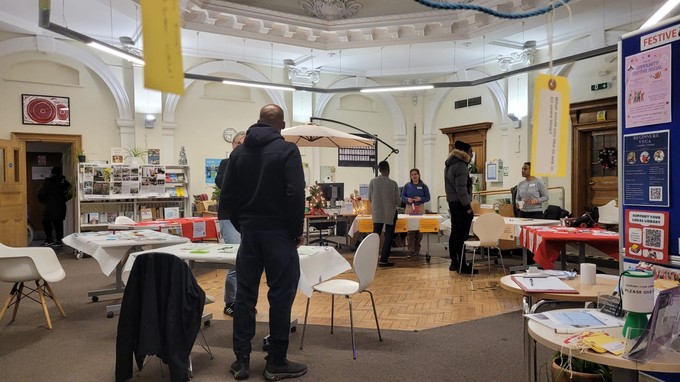
Corbett Community Library, London
The Corbett Community Library located in Catford, operates as a registered charity. It was set up by local groups to save the library when Lewisham Council announced that the library would need to close due to budget cuts. In 2016, the new library opened and was run entirely by volunteers, with the objective of involving the community in the management and governance of the library. The library provides the typical library services including books, study spaces and digital services. It also serves as a community centre hosting a range of activities and events for the local community. This includes storytime sessions, weekly Homework Club, and Online Support Services, helping local people access advice and benefits. The library targets groups with specific needs providing ESOL classes and a dementia support group, helping build connections. Additional activities and programs are run to support people facing loneliness or isolation, providing a space for people to meet friends and helping to build relationships amongst people from different backgrounds.
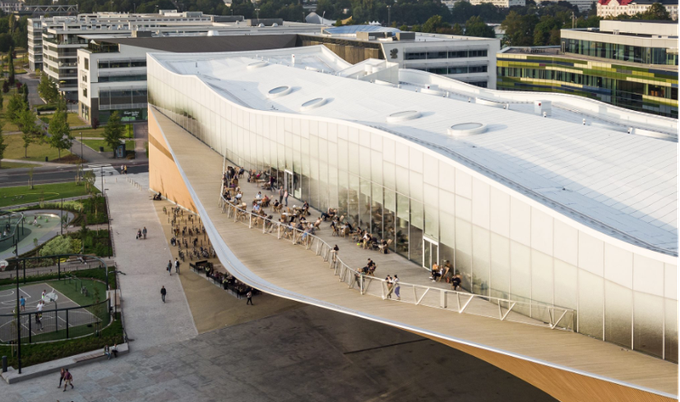
Oodi Helsinki Central Library, Finland
The Oodi Library in Helsinki opened in 2019. It serves not only as an architectural landmark but also as a cultural landmark that has redefined the concept of social infrastructure. The 10,000m 2 space houses over 100,000 books but also serves as a dynamic community and cultural space where people come together for events, activities, and learning. The library also offers access to a range of digital services with the aim of supporting digital literacy and offers various educational courses such as coding workshops and entrepreneurship courses, contributing to learning and innovation.
The programs on the ground floor of the library are designed to encourage socialising, with a restaurant, movie theatre and event spaces. The second floor includes workspaces, games rooms, musical instruments and is designed to encourage creativity. The upper floor hosts the reading room and a panoramic roof terrace. The library was co-designed by more than 3,000 citizens who contributed to the plans. Ideas were crowdsourced and citizens were given the ability to vote on the design and programmes. This approach to participatory planning was considered radical in terms of citizen engagement. It ensured the space responded to the evolving needs of the city's diverse population. Oodi had over 3.1 million visitors in its first year alone and has hosted 7,000 events attracting more than 300,000 participants.
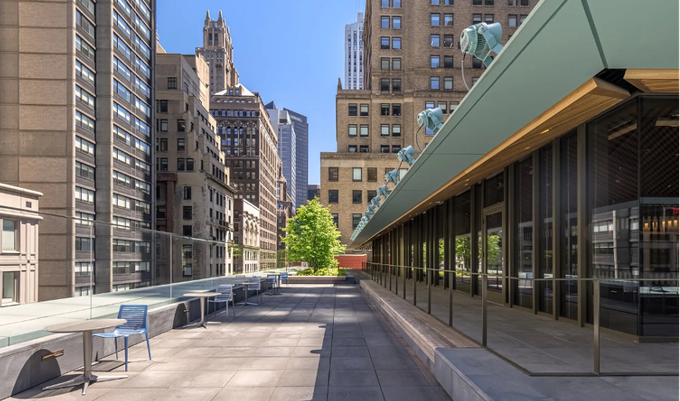
The Stavros Niarchos Foundation Library, Manhattan
The Stavros Niarchos Foundation Library in Manhattan exemplifies the impact that social infrastructure can have on communities and urban development. The library functions as a dynamic community hub and a valuable education resource. The eight floors are carefully configured to foster connections, learning and personal and professional growth. These floors encompass a range of amenities and programming, including a business centre for entrepreneurial endeavours, a learning centre for skills development, classrooms, and breakout spaces, all with the intention to encourage connections and networking opportunities.
One distinctive feature is the upper floor roof terrace. This open space hosts a coffee shop and offers views of Bryant Park and is the only free and publicly accessible roof terrace in Midtown Manhattan. The accessible roof terrace underscores the library’s commitment to inclusivity and community engagement. It transforms the space into a destination where visitors can gather and socialise while enjoying a public space.
As well as their educational and cultural roles, libraries across the UK took on the role of warm banks over the winter of 2022-2023, amidst rising energy bills and increased cost of living across. This transformation demonstrates the adaptability and community-driven nature of libraries. There are no barriers to entry, and their presence as an accessible and welcoming space means they can flex to respond to crisis and urgent challenges. As buildings that are always publically accessible, they avoided the stigma of some warm banks. Beyond offering refuge from the cold winter, these libraries also served as spaces for social interactions and community building. This aspect was especially valuable in tackling loneliness and isolation, particularly among older people and people living on their own.
Libraries are invaluable institutions that play a pivotal role in our communities and serve as critical components of social infrastructure. Despite cuts to public spending and library closures, they continue to serve as essential contributors to education, local social life and community development.
The Oodi Library in Helsinki and the Stavros Niarchos Foundation Library in Manhattan demonstrates how libraries can surpass their traditional roles. These modern libraries have been able to provide spaces for innovation, creativity and social engagement. Libraries can respond to practical needs but also play a pivotal role in supporting the well-being of communities in challenging times. Libraries are much more than buildings that house books, but dynamic and inclusive spaces thatenrich our communities and provide individuals and communities with the tools to grow and become more resilient. We need to recognise the value and significance that libraries play within our communities and our society.
Photo sources
Oodi https://reasonstobecheerful.world/oodi-library-helsinki-future/, Manhatten
Stavros Niarchos Foundation Library https://www.nytimes.com/2021/07/04/arts/design/Stavros-Niarchos-Foundation-Library-review.html